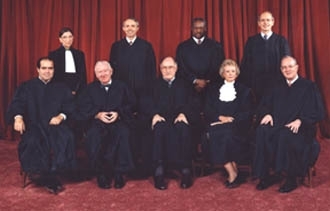WASHINGTON, June 14 (JTA) — An issue many Jewish groups did not want to delve into will remain unresolved, as the Supreme Court has chosen not to rule on whether the phrase “under God” can be part of the Pledge of Allegiance. In a ruling Monday, the court decided that Michael Newdow did not have the authority to challenge the constitutionality of the pledge’s wording, as recited in his daughter’s California school, because he is not her custodian. The ruling overturns a lower court decision that it’s unconstitutional to include “under God” in the pledge, and allows the words to stay in for now. While the decision leaves a major constitutional question unanswered, it also takes the issue out of the public debate for the time being. The majority opinion, written by Justice John Paul Stevens, did not discuss whether the wording infringes on the separation of church and state. In a concurring opinion, Chief Justice William Rehnquist, who was joined by Justices Sandra Day O’Connor and Clarence Thomas, argued that the pledge’s language doesn’t violate the Constitution. The narrow ruling keeps alive an issue that has divided the Jewish community. While many Jews support the type of ceremonial deism that brings terms like “under God” and “in God we trust” into the governmental context, other Jews increasingly have found problematic the presence of religion or religious references in the public sphere. The issue has caused heated debate in Jewish organizations, and some Jewish groups have reversed their own opinions on the topic. The ruling also is likely to keep the pledge from becoming a major issue in November’s presidential elections. The California appeals court ruling against the pledge caused a strong backlash across the country two years ago, and calling the pledge unconstitutional would have put the issue front and center in the race for the White House, analysts said. “This avoided a political hand grenade in an already contentious political race largely focusing on social issues,” said Marc Stern, a lawyer for the American Jewish Congress, which filed a brief in favor of leaving the phrase intact. Furthermore, the ruling suggests limitations to a non-custodial parent’s rights to challenge a third party’s actions. For Jews, that could have implications for child-rearing disputes when interfaith marriages end in divorce. Because the ruling did not focus on the merits of the case, a similar case could well be brought in the near future, with a new plaintiff. Traditionally, Jewish groups have supported the invocation of ceremonial deism phrases because they were seen as Judeo-Christian in nature, and therefore inclusive of Jews. Some Jewish groups have wanted to maintain the status quo out of fear that new phrases installed through Constitutional amendments would be more Christian in nature. But while many Jewish organizations have gone on record in favor of the language, the issue has been contentious among their members. Many liberal Jews feel the phrases violate the separation of church and state and want Jewish organizational officials to take a more aggressive approach. In 2002, when the appeals court ruled in favor of Newdow, the Anti-Defamation League said the ruling “goes against the culture and traditions of this country, which was founded on principles respectful of faith.” Later, succumbing to pressure from its lay leadership, the ADL filed a brief to the Supreme Court on behalf of Newdow. The only Jewish group to make a case against the phrase, ADL argued that the pledge, led by a teacher, places subtle coercive pressure on students to embrace God when they are too young to critically reflect on the meaning of what they are saying. “I think, for now, it quiets the debate,” said Steven Freeman, ADL’s director of legal affairs. “While it may come back, I don’t think it is going to happen so quickly.” In her opinion, O’Connor suggested a four-pronged test for ceremonial deism. Under her definition, acceptable uses of God would be ones with a strong history and ubiquity, an absence of worship or prayer, no reference to a particular religion and minimal religious content. That would include the phrase “In God We Trust,” which is written on U.S. currency, and the phrase, “God save the United States and this honorable court,” which opens each Supreme Court session. “These references are not minor trespasses upon the Establishment Cause to which I turn a blind eye,” O’Connor wrote. “Instead, their history, character and context prevent them from being constitutional violations at all.” The issue over which the court rejected the case — Newdow’s right, since he is not the custodial parent, to challenge actions that affect his daughter — raises other issues that may resonate in the Jewish community. The ruling does not say that non-custodial parents have no right to argue with the other parent about the child’s upbringing, but it does question the legitimacy of cases against a third party — in this case, the school board that encouraged Newdow’s daughter to say the pledge. Stevens argued that cases such as these should be dealt with primarily in family and state courts.

Help ensure Jewish news remains accessible to all. Your donation to the Jewish Telegraphic Agency powers the trusted journalism that has connected Jewish communities worldwide for more than 100 years. With your help, JTA can continue to deliver vital news and insights. Donate today.






